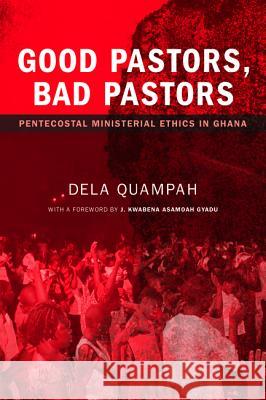Good Pastors, Bad Pastors: Pentecostal Ministerial Ethics in Ghana » książka
Good Pastors, Bad Pastors: Pentecostal Ministerial Ethics in Ghana
ISBN-13: 9781625640512 / Angielski / Miękka / 2014 / 246 str.
The emergence of Pentecostalism in Ghana has attracted a massive following and generated institutions that have significantly impacted Christian discourse and national life. The movement has produced prominent leaders who have developed exemplary Christian education programs and generated volumes of Christian literature unprecedented in Ghanaian Christianity. Nevertheless, public opinion often upbraids church leaders for unethical conduct. Despite the concern for high moral standards set by Pentecostal church polity and ministerial ethical codes, reports of Pentecostal ministerial misconduct appear regularly in the media. Although congregation members and perceptive public observers appreciate the constructive moral impact of Pentecostal ministers, instances of promiscuity, power abuse, financial misappropriation, and superstition reveal a gap between ethical ideals and practice. As this research reveals, factors behind unethical ministerial conduct include inadequate training, poor accountability, and a general low level of ethical reflection. Good Pastors, Bad Pastors suggests that a multidimensional approach of responsible reportage, emphatic moral education, appropriate but sympathetic response to moral failure, and peer-review accountability could help uphold a higher standard of ministerial ethics. ""Dela Quampah's book highlights the ethical challenges facing pastors in the twenty-first century, not only in the pentecostal churches, but in the ministries of every church. It is a must-read for all who are concerned about the holiness of the Christian churches."" --Chris Thomas, Dean, School of Theology and Missions, Central University College, Accra, Ghana ""In this work, Quampah offers a very balanced study of ministerial ethics that should benefit not only ecclesiastical leaders who have to maintain discipline in the ministry but also ministers themselves, as well as congregation members who would want to be equipped to hold their leaders accountable. I recommend this book to academics and practitioners alike; it has much to offer in helping to preserve and improve the image of ministers."" --B. Y. Quarshie, Rector, Akrofi-Christaller Institute of Theology, Mission and Culture, Akropong-Akuapem, Ghana ""It is a privilege for me to make a comment on this important, well-balanced, and carefully written book. Good Pastors, Bad Pastors is one of the very few that have been written so far on the subject of ministerial ethics within the Ghanaian context. It is also very relevant in the contemporary Ghanaian situation in which hardly a day passes without moral failures being reported among religious leaders in the Ghanaian media. . . . It is highly recommended for every theological/religious institution at all levels."" --Rebecca Ganusah, Former Head of Department, Department for the Study of Religions, University of Ghana, Accra, Ghana Dela Quampah is a full-time pastor of the Church of Pentecost, the largest Pentecostal denomination in Ghana, as well as a lecturer in Christian Ethics at Pentecost Theological Seminary. He earned his bachelor's and doctorate degrees at the University of Ghana, Legon, and in between these two degrees, he studied at Regents Theology College, UK, for his masters in theology. Dela has also authored a book on the Beatitudes.
The emergence of Pentecostalism in Ghana has attracted a massive following and generated institutions that have significantly impacted Christian discourse and national life. The movement has produced prominent leaders who have developed exemplary Christian education programs and generated volumes of Christian literature unprecedented in Ghanaian Christianity. Nevertheless, public opinion often upbraids church leaders for unethical conduct. Despite the concern for high moral standards set by Pentecostal church polity and ministerial ethical codes, reports of Pentecostal ministerial misconduct appear regularly in the media. Although congregation members and perceptive public observers appreciate the constructive moral impact of Pentecostal ministers, instances of promiscuity, power abuse, financial misappropriation, and superstition reveal a gap between ethical ideals and practice. As this research reveals, factors behind unethical ministerial conduct include inadequate training, poor accountability, and a general low level of ethical reflection. Good Pastors, Bad Pastors suggests that a multidimensional approach of responsible reportage, emphatic moral education, appropriate but sympathetic response to moral failure, and peer-review accountability could help uphold a higher standard of ministerial ethics.""Dela Quampahs book highlights the ethical challenges facing pastors in the twenty-first century, not only in the pentecostal churches, but in the ministries of every church. It is a must-read for all who are concerned about the holiness of the Christian churches.""--Chris Thomas, Dean, School of Theology and Missions, Central University College, Accra, Ghana""In this work, Quampah offers a very balanced study of ministerial ethics that should benefit not only ecclesiastical leaders who have to maintain discipline in the ministry but also ministers themselves, as well as congregation members who would want to be equipped to hold their leaders accountable. I recommend this book to academics and practitioners alike; it has much to offer in helping to preserve and improve the image of ministers.""--B. Y. Quarshie, Rector, Akrofi-Christaller Institute of Theology, Mission and Culture, Akropong-Akuapem, Ghana""It is a privilege for me to make a comment on this important, well-balanced, and carefully written book. Good Pastors, Bad Pastors is one of the very few that have been written so far on the subject of ministerial ethics within the Ghanaian context. It is also very relevant in the contemporary Ghanaian situation in which hardly a day passes without moral failures being reported among religious leaders in the Ghanaian media. . . . It is highly recommended for every theological/religious institution at all levels.""--Rebecca Ganusah, Former Head of Department, Department for the Study of Religions, University of Ghana, Accra, GhanaDela Quampah is a full-time pastor of the Church of Pentecost, the largest Pentecostal denomination in Ghana, as well as a lecturer in Christian Ethics at Pentecost Theological Seminary. He earned his bachelors and doctorate degrees at the University of Ghana, Legon, and in between these two degrees, he studied at Regents Theology College, UK, for his masters in theology. Dela has also authored a book on the Beatitudes.











